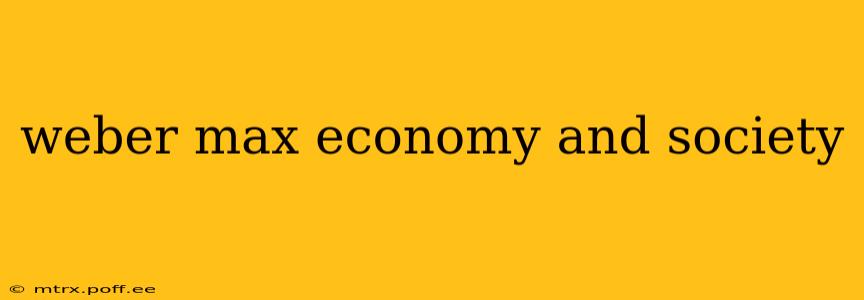Max Weber's Economy and Society stands as a monumental achievement in sociological theory, a sprawling and multifaceted work that continues to shape contemporary social science. This isn't just a book; it's a foundational text, offering profound insights into the relationship between economic systems, social structures, and individual action. Understanding its core concepts is key to comprehending modern sociological thought. This exploration will delve into its key themes, clarifying its complexities and answering frequently asked questions.
What is the main argument of Weber's Economy and Society?
Weber's Economy and Society doesn't present a single, overarching argument. Instead, it's a collection of interconnected essays and analyses exploring diverse facets of social life, emphasizing the interplay between economic activity and the broader social context. A central theme revolves around the concept of ideal types, conceptual tools Weber used to analyze the various forms of social action, domination, and economic organization. He doesn't claim these ideal types exist in pure form in the real world but uses them as analytical benchmarks to understand the complexities of social reality. He examines different types of authority, bureaucracy, social stratification, and the relationship between religion and economic development, all within the context of historical and comparative analysis.
What are the key concepts in Weber's Economy and Society?
Several key concepts underpin Weber's work in Economy and Society:
- Ideal Types: Abstract models that simplify reality to highlight specific characteristics. For example, he uses the ideal type of "bureaucracy" to analyze the organizational structure of modern states and corporations.
- Social Action: Weber categorized actions based on their motivations—instrumental rationality, value rationality, affectual action, and traditional action. Understanding these categories helps analyze individual behavior within specific social contexts.
- Rationalization: A process of increasing efficiency and calculability in social life, often associated with the rise of bureaucracy and capitalism.
- Authority: Weber identified three ideal types of authority: traditional (based on custom), charismatic (based on individual personality), and rational-legal (based on rules and procedures).
- Stratification: Weber argued that social stratification is multi-dimensional, involving class (economic position), status (social honor), and party (political power).
- Protestant Ethic and the Spirit of Capitalism: This is perhaps Weber's most famous concept, explored in detail in a separate work but deeply relevant to Economy and Society. It argues that certain aspects of Protestant religious beliefs contributed to the development of capitalism.
What is the difference between Weber's and Marx's theories?
While both Marx and Weber were highly influential sociologists who studied the relationship between economics and society, their approaches differed significantly. Marx focused on the material conditions of production and the inherent conflicts between classes as the driving forces of historical change. Weber, while acknowledging the importance of economic factors, emphasized the role of ideas, values, and social structures in shaping social action and historical development. He argued that the influence of ideas, including religious beliefs, could be significant drivers of social change, a point of major divergence from Marx's primarily materialist perspective.
How does Weber's work relate to contemporary sociology?
Weber's work remains highly relevant to contemporary sociology. His concepts of rationalization, bureaucracy, and social stratification continue to be central themes in sociological research. His emphasis on the subjective understanding of social action (verstehen) and the importance of comparative analysis remains profoundly influential. Researchers across numerous areas, from organizational studies to political sociology, still draw upon Weber's insights and methods.
What is the significance of Weber's concept of bureaucracy?
Weber's analysis of bureaucracy is perhaps one of his most enduring contributions. He recognized bureaucracy as a highly efficient form of organization based on clearly defined rules, hierarchical authority, and specialized roles. However, he also highlighted the potential downsides of bureaucracy—impersonality, rigidity, and the potential for iron cages of routine and dehumanization. His analysis remains highly pertinent in understanding the complexities of modern organizations and their impact on individuals.
What are some criticisms of Weber's work?
While highly influential, Weber's work has faced criticism. Some argue that his ideal types are overly abstract and fail to fully capture the complexities of social reality. Others criticize his emphasis on individual action, neglecting the importance of broader social forces and structures. Furthermore, some have questioned the universality of his claims about the relationship between religion and capitalism. Despite these criticisms, Weber's contributions remain central to sociological thinking.
In conclusion, Economy and Society is not a light read, but it is an essential one for anyone seriously interested in understanding the complexities of social organization, economic systems, and the interplay between individual actions and broader societal structures. Weber’s legacy continues to inspire and challenge sociologists, making his work as relevant today as it was when it was first written.
